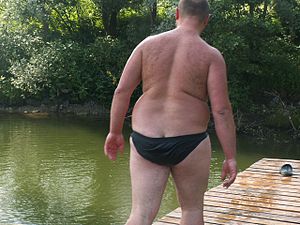You have just arrived in La Belle France, it’s a beautifully sunny day and you want to get talking with all the locals. It’s easy: saunter up to a nice-looking person, put on your friendliest smile and say bonjour! This means good day and you can say this regardless of whether it is in the morning (le matin) or afternoon (l’après-midi). In most of the countries where Romance languages are spoken it is not so common to say “good morning” like the English tend to do, they just say “good day”, as the Aussies are wont to do. To be polite, if you are talking to a man you would say bonjour, monsieur, if it was a woman you would say bonjour, madame, and if it was a young woman who was probably not yet married you might say bonjour, mademoiselle (but why are you chatting up young unmarried women, huh? Really!) Or if you wanted to ditch all formalities and be very casual you could simply say allo (remember that great TV series ‘Allo, ‘Allo?) or salut. In the evening instead of bonjour you would say bonsoir.
To keep the conversation going, next you could say “voulez-vous coucher avec moi ce soir?” …. oops, I am getting ahead of myself, that bit should come later (c’est une blague, that’s a joke)… no, next you should inquire about their health. Say comment allez-vous?, meaning how are you (going?), or less formally, comment ça va?, meaning how’s it going?
The response to this should be bien, merci, meaning fine thanks, or even better, très bien, merci, meaning very well thanks. (But don’t get this confused with merci bien! which means thanks very much!) After this it is polite to return the inquiry, so you should ask et toi? or et vous? meaning and you? (the latter is more formal).
Related vocabulary
Le jour means daylight as well as day, grand jour or plein jour means broad daylight. De nos jours means nowadays. But there is another, less common word for day in french, la journée, just as there is le matin and la matinée for morning and le soir and la soirée for evening (a good explanation of the differences is to be found here). Tout la journée means all day long. Anyone who has been to a matinée performance at a theatre or cinema will understand the meaning of that word, but there is also the expression faire la grasse matinée, which means to sleep in (but it would be translated literally as to make a fat morning).
I love fat mornings! Sleeping in is one of my favourite pastimes. Whenever my mornings say they want to lose weight and go on a diet I say, “No, no, I like you the way you are, you can even put on weight, the fatter you are, the better, as far as I am concerned. Supersize thee!”
I am at the age now when siestas are looking very attractive too so je vais faire le gras après-midi aussi (I am going to make a fat afternoon as well).
To get you in the mood for visiting La Belle France, here is a song of the same name by one Sonny Worthing. I don’t know anything about him, I remember hearing this song on South African radio stations as a teenager in the mid-1970s and I have never thought of it since until I wrote the first sentence of this post, when I started humming it to myself as I wrote. It’s funny how your brain stores some memory away for years and then suddenly releases it. The chorus goes La belle France, la vie d’amour, La belle France toujours (Beautiful France, the life of love, beautiful France forever). It’s a jolly, cheesy, tuneful, typically silly ’70s ditty about an idealised life in France, but I prefer it to all those dreadful renditions of Voulez-vous coucher avec moi ce soir (which for the innocent among you means Do you want to sleep with me tonight). Take it away, Sonny boy!


3 comments
bonne nuit – and perhaps je vais faire le gras nuit aussi
Bonne nuit aussi, and yes, I agree, have a good lie-in at night time too, enjoy!
[…] Let’s chat up some French people and have fat mornings (myfiveromances.wordpress.com) […]